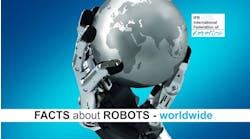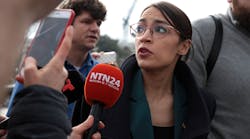As Democrats unveiled their ambitious Green New Deal to fight climate change on Thursday, a controversy erupted over the role of nuclear power that threatened to undermine the whole effort.
A fact sheet distributed by the office of progressive newcomer Alexandria Ocasio-Cortez, a Democratic representative from New York, said there was no room in the nation's all renewable-energy future for nuclear plants.
But the reference caught many off guard and back-peddling ensued.
Giselle Barry, a spokeswoman for Senator Ed Markey, a Massachusetts Democrat who is the Green New Deal's lead Senate backer, disowned the fact sheet and said Markey's office wasn't consulted before it was sent out. "We did not draft that fact sheet," she said.
Markey sought to do damage control at a midday press conference, emphasizing the proposed resolution doesn't address specific energy technologies. Language on nuclear power "is not part of this legislation," he said. "The resolution is silent on any individual technology that can move us to a solution."
The stumble irked potential supporters. It also illustrated the political challenges ahead as supporters of the Green New Deal struggle to build consensus on issues that divide environmentalists as well as lawmakers.
The plan, in the form of a non-binding resolution, weaves together what had been a hodgepodge of progressive proposals and aspirations into a single initiative. It sets a goal of shifting the nation to 100 percent "clean, renewable, and zero-emission energy sources," within 10 years "to achieve net-zero greenhouse gas emissions through a fair and just transition for all communities and workers."
The proposal has gathered 60 co-sponsors in the House but has little chance of gaining support in the Republican-controlled Senate, let alone being signed into law by President Donald Trump.
House Speaker Nancy Pelosi, who hasn't explicitly thrown her support behind the Green New Deal, didn't appear at the unveiling. She described the plan at another event as "one among many" ways to address climate change.
Some of the biggest climate champions in the Senate, including Sheldon Whitehouse, a Democrat from Rhode Island who delivers frequent floor speeches on the urgent need to act, were notably absent from the news conference unveiling the Green New Deal. For any effort to succeed, it will need support from long-time environmental policy advocates in Congress as well as the ardent activists that have rallied behind Ocasio-Cortez's vision.
The scale and ambition of the initiative also presents problems. Ocasio-Cortez has pitched it not just as an environmental solution but also a World-War II-style "mobilization" against income inequality and social injustice.
That invites criticism that the whole gambit is socialism run amok. The Chamber of Commerce slammed the proposal in a statement that invoked "failed socialist policies."
Opposition on the left emerged over the plan's failure to eventually ban fossil fuels, the leading source of the carbon dioxide emissions linked to global warming.
Friends of the Earth president Erich Pica praised the resolution as "a good first step," but said it was incomplete. "By failing to expressly call for an end of the fossil fuel era, the resolution misses an opportunity to define the scope of the challenge," Pica said.
Fact Sheet
The Green Party faulted the omission: "We cannot begin from a position of compromise."
After the dustup on nuclear power, Corbin Trent, a spokesman for Ocasio-Cortez, said a new fact sheet was being prepared.
But the damage was already done. Environmental pragmatists who see nuclear power as an essential ingredient to decarbonization -- and say the U.S. can't do it with solar, wind and hydropower alone -- blasted the move.
"I'm sure it has some co-sponsors scratching their heads," said Jeff Navin, who served as acting chief of staff for Ernest Moniz, President Barack Obama's energy secretary.
Moniz himself said that it may be impossible to achieve zero carbon emissions in 10 years, as the plan calls for.
"It's just impracticable," Moniz told National Public Radio. "And what concerns me about that is if we start putting out impracticable targets we may lose a lot of key constituencies that we need to bring along."
He cited labor unions as an example.
"We cannot strand too many assets and frankly stand too many workers with impracticable unrealizable objectives," Moniz said. "We will jeopardize what I think has been the very significant movement of the large energy companies toward developing their new business models to function in a low carbon world."
The episode also underscores the rift among U.S. environmentalists on nuclear power. Legions of environmentalists recall the near meltdown at the 1979 Three Mile Island nuclear plant in Pennsylvania, an episode that made opposition to nuclear power a mainstay of the movement for decades.
Nuclear's Power
But nuclear power provides more than 50% of the country's carbon-free electricity, according to the Nuclear Energy Institute, a trade group that represents companies such as Westinghouse Electric Co. and Exelon Corp.
"Any approach to eliminating greenhouse-gas emissions requires all clean energy technologies, including nuclear, to work together to address that urgent problem," Maria Korsnick, the group's president said in a statement issued after the Green New Deal was unveiled.
Thursday's kerfuffle over nuclear might just be a taste of things to come.
"These are ideological documents -- not legislative blueprints," said Paul Bledsoe, strategic adviser at the Progressive Policy Institute. It will get even tougher "when you actually have to create legislative language."










